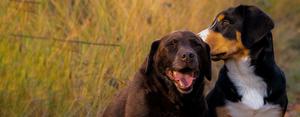Morris Animal Foundation
image:
A new scientific publication in the Journal of the American Veterinary Medical Association indicates that obesity rates in sterilized dogs vary by breed size.
view more
A new scientific publication in the Journal of the American Veterinary Medical Association indicates that obesity rates in sterilized dogs vary by breed size.
Credit: seppe machielsen
DENVER/Oct. 17, 2023 – As researchers continue to delve into the effects – both negative and positive – of spaying and neutering dogs, data included in a recent scientific publication in the Journal of the American Veterinary Medical Association indicate that obesity rates in sterilized dogs vary by breed size.
In the United States, about 70-80% of dogs are sterilized. This is beneficial as it helps reduce unwanted births, according to Valerie Benka, Program Director at the Alliance for Contraception in Cats & Dogs, and a member of the multidisciplinary research team that performed the study. However, questions remain about the health and behavioral impacts of the procedure.
“There are alarming rates of obesity among dogs in the United States and several other countries,” Benka said. “On its own, being overweight or obese is not good for a dog’s health, well-being or longevity, plus it can contribute to other health problems.”
The data presented in this publication suggest that the risk of obesity differs with body size. Sterilized small dogs face the highest risk, while giant-breed dogs have the lowest. Surprisingly, large breeds like Labrador retrievers, German shepherds and golden retrievers exhibit obesity rates akin to small dogs.
Additionally, the research highlights that the timing of sterilization plays a crucial role. Sterilizing dogs at one year of age tends to result in a lower risk of obesity. However, the optimal timing varies by breed size. Notably, large dogs sterilized at three or six months face a higher risk of obesity, a significant finding.
Furthermore, the data presented demonstrate that, when all other factors are equal – breed, size and age at sterilization – males have a higher risk of obesity compared to females, contrary to common assumptions, Benka added.
Benka said unlike other studies on this topic, this Morris Animal Foundation-funded research drew on a comprehensive dataset of more than 155,000 dog records from U.S. Banfield Pet Hospital clinics. This project also differed from previous studies by including both purebred and mixed-breed dogs, and differentiating between sizes among those mixed breeds, providing a more representative sample of the dog population.
“We are tremendously grateful to Morris Animal Foundation for recognizing the importance of this project and supporting it,” Benka said. “The Foundation is supporting comprehensive research, our work with a fantastic statistical data analyst and expert team, and our ability to publish our preliminary and future papers open access so that everyone can view them.”
Next, Benka said she and her team are working on a publication leveraging this data to analyze the outcomes of specific breeds. Additionally, they will explore the correlation between sterilization, obesity and cranial cruciate ligament injuries in dogs.
About Morris Animal Foundation
Morris Animal Foundation’s mission is to bridge science and resources to advance the health of animals. Founded in 1948 and headquartered in Denver, it is one of the largest nonprofit animal health research organizations in the world, funding nearly $160 million in more than 3,000 critical animal health studies to date across a broad range of species. Learn more at morrisanimalfoundation.org.
Media Contact: Annie Mehl
Journal of the American Veterinary Medical Association
Studying Health Conditions Associated with Spay/Neuter in Dogs
Disclaimer: AAAS and EurekAlert! are not responsible for the accuracy of news releases posted to EurekAlert! by contributing institutions or for the use of any information through the EurekAlert system.
Media Contact
Annie Mehl
Morris Animal Foundation
amehl@morrisanimalfoundation.org
Morris Animal Foundation


Copyright © 2024 by the American Association for the Advancement of Science (AAAS)
Copyright © 2024 by the American Association for the Advancement of Science (AAAS)

